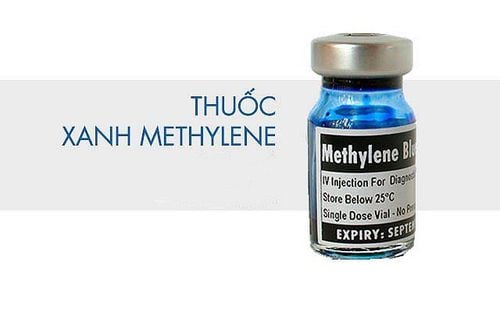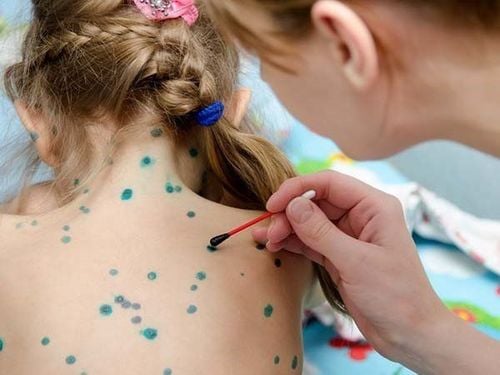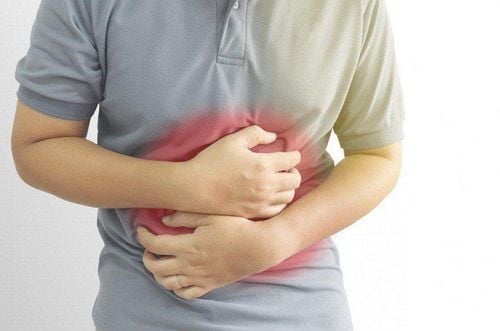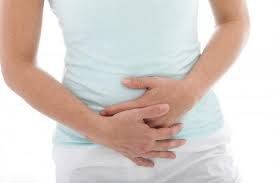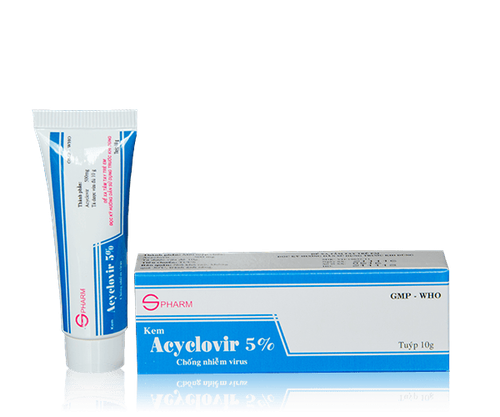This is an automatically translated article.
The article was professionally consulted with Specialist Doctor II Huynh Thi Diem Thuy - Vaccine Consultant - Pediatrics - Neonatology Department, Vinmec Central Park International General Hospital.If the mother has chickenpox, to avoid transmitting the disease to the baby, the mother needs to abstain from breastfeeding directly from the mother's breast, after the disease is cured, the mother can breastfeed the baby as usual.
1. How to cure chickenpox for nursing mothers
Chickenpox is an acute infection caused by a virus called Varicella-Zoster. Chickenpox is very contagious, mainly through the respiratory tract when two people come into contact, talk to each other. When an infected person coughs, sneezes or talks, secretions containing the virus will be released, if other people inhale this secretion, they will also become infected. At the same time, chickenpox can also be transmitted indirectly when a healthy person comes into contact with broken blisters or sores on the skin of an infected person.Chickenpox is a viral disease, if there is no bacterial superinfection (with swelling, redness, pain, pus) then there is no need to take antibiotics. To prevent infection with broken chickenpox nodules, and even when not broken, it is necessary to apply methylene blue, eosin red, potassium permanganate... In order for the disease to heal quickly, the patient needs to eat enough nutrients, rest, and wear clothing. loose, light, thin, airy clothes. Change clothes twice a day and shower daily with warm water in an airtight room.

Để nhanh khỏi, bệnh nhân nên nghỉ ngơi hợp lý
2. Breastfeeding when mother has chickenpox
Technically, the newborn baby's body is still weak and has low resistance, so it is easy to spread disease, especially from those who take care of the baby directly such as grandparents and parents. The incubation period, 2-3 days before the patient develops blisters, is the most contagious, followed by about 2 weeks when the blisters are present.For nursing mothers who have chickenpox, during the illness, mothers should apply principles such as:
Maintain cleanliness in daily life Take a shower with warm water Eat enough food nutrients to increase resistance and reduce the risk of chickenpox complications, drink a lot of water... Drink a lot of orange and lemon juice to increase vitamin C During the entire illness, completely isolate your baby if As observed, the baby showed no signs of infection. Chickenpox is considered a benign disease, but they also leave certain complications, you should not be subjective.
Absolutely do not scratch the chickenpox blisters lest they spread faster, if the itching is too unbearable, you can use 1% methylene blue solution applied twice a day.
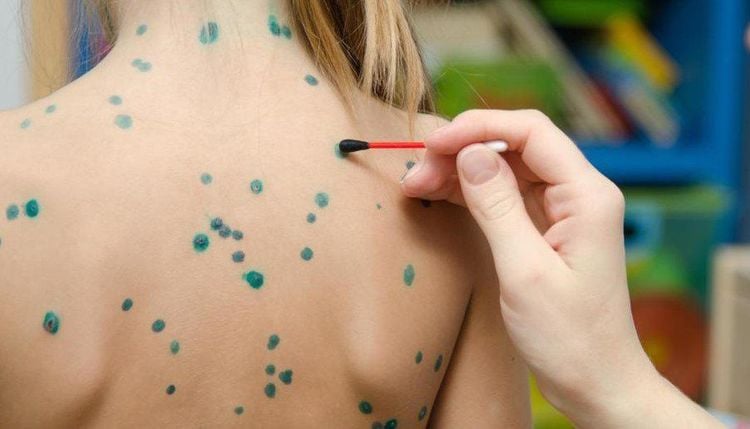
Thủy đậu có thể bôi Xanh Methylen giúp sát trùng, chóng lành vết thương
While the mother is still having blisters, the child should sleep separately, isolated from the mother. If the mother is taking drugs that are contraindicated for breastfeeding women, they should not breast-feed. If there are abstinence measures and careful hygiene, the disease will go away on its own after about 10-15 days from the date of typhus. After recovering from the disease, the mother can breastfeed the baby as usual without fear of the drug affecting the baby because the drug has been eliminated and eliminated from the mother's body.
If the mother has chickenpox, to avoid spreading the disease to the baby, the mother needs to abstain from breastfeeding directly from the mother's breast. Mothers who have chickenpox while breastfeeding can still breastfeed, but need to be very careful when breastfeeding. When breastfeeding, the mother should note the following points:
If the mother is having chickenpox in the early stages, she should express the milk in a bottle and ask someone else to feed the baby. Limit contact between mother and baby, it is best to let the baby sleep separately and isolate the mother. Because the baby is still young, the resistance is still weak, so the mother needs to pay attention to the prevention of infectious diseases for the baby. If the baby does not accept the bottle but only breastfeeds directly, you need to wear a mask when feeding. In particular, limit talking and contact with children to limit secretions. In addition, the mother must also be careful not to let the baby rub the broken peas and this fluid will stick to the baby's body, which will cause the baby to be infected. Should let the child sleep separately, isolated from the mother. Limit talking to your children or wear a mask to prevent secretions from splashing. Be careful not to let the baby rub to break the blisters and this fluid gets on the baby's body, causing the baby to become infected. Cut your baby's fingernails to avoid the baby using his nails to scratch and peel off the sores, the secretions will make the baby infected. However, the best advice is still that mothers should get vaccinated against chickenpox before having children (if they have never had it). Because the mother has vaccinated and breastfed, antibodies will follow the milk sugar into the baby's body, protecting the baby in the first 12 months of life, even if exposed to pathogens.
Women who have not been vaccinated but are infected in the first 3 months of pregnancy will seriously affect the fetus such as congenital chickenpox, multiple malformations, heart, eyes, miscarriage... The mother then It is also very easy to get pneumonia. To prevent children from getting chickenpox, children 1 year of age and older should also be vaccinated against chickenpox.
Please dial HOTLINE for more information or register for an appointment HERE. Download MyVinmec app to make appointments faster and to manage your bookings easily.




